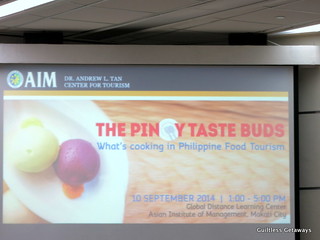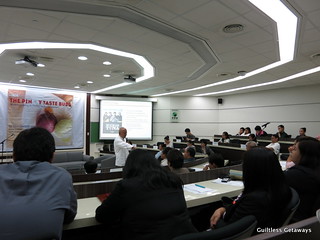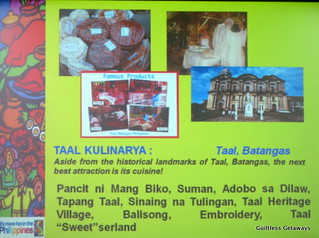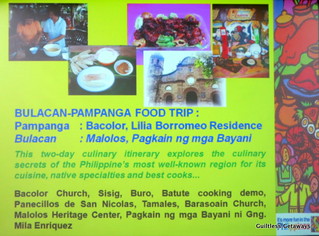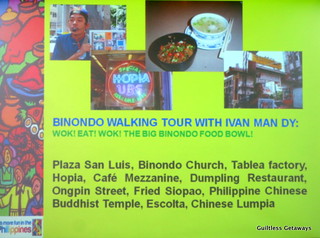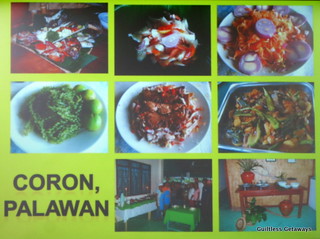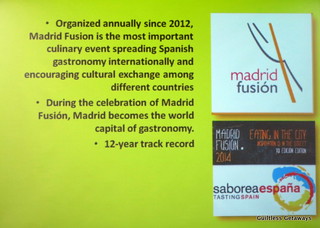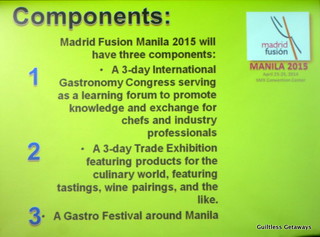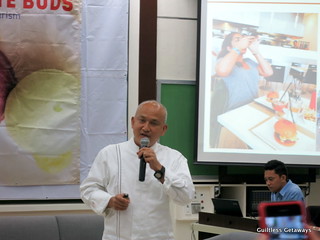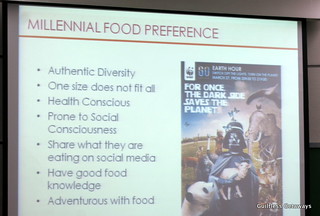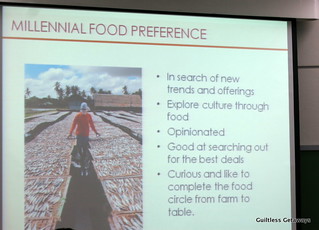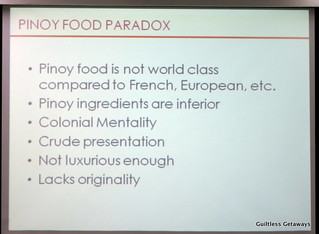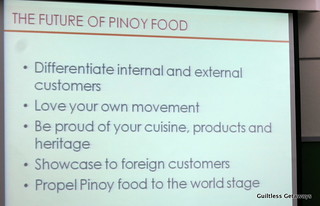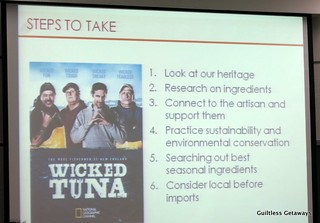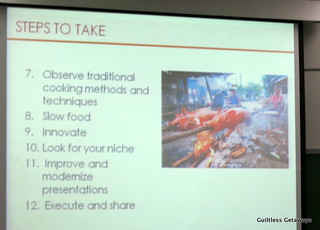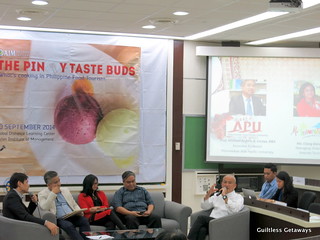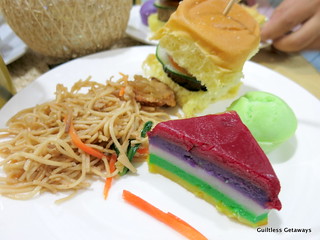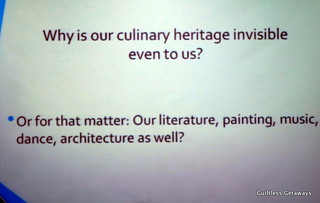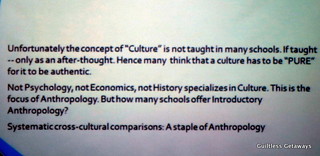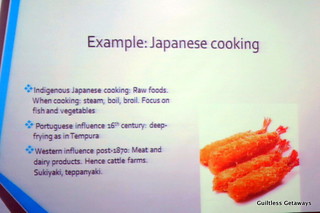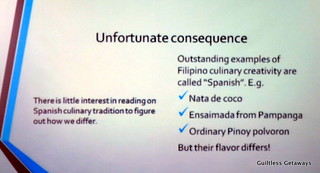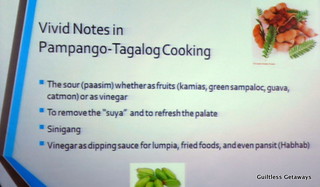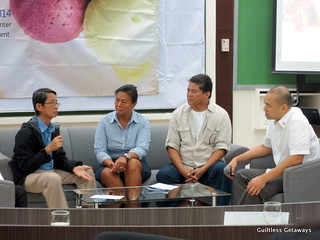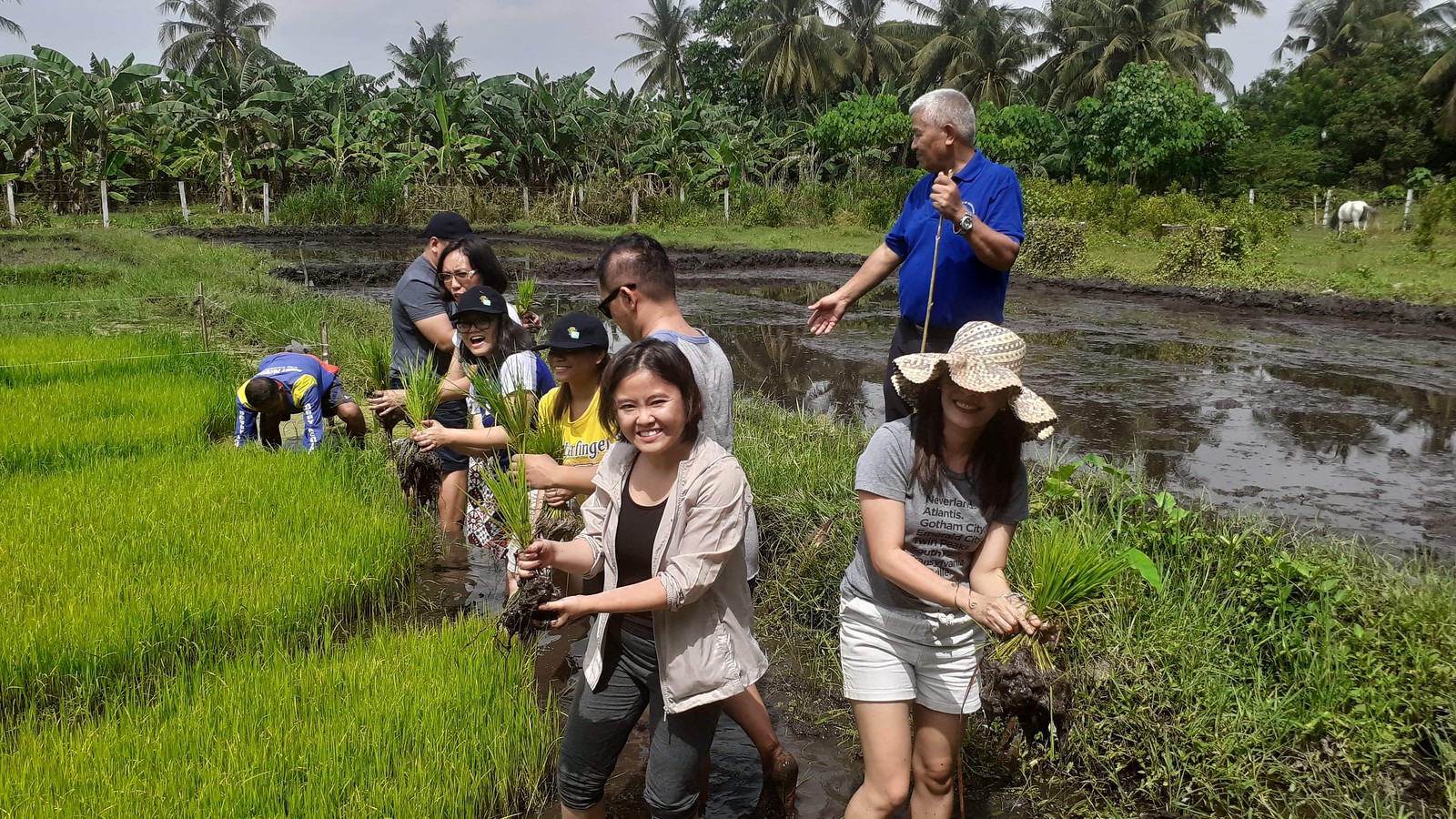I just attended the latest forum The Pinoy Taste Buds: What's Cooking in Philippine Food Tourism held by the AIM (Asian Institute of Management Makati) Dr. Andrew L. Tan Center for Tourism about Pinoy food :) Representatives from the Department of Tourism, the academe and chefs were the speakers this time around. The discourse revolved around our cuisine and the various ways to include it and promote it as an integral part of Philippine tourism. I've included links and details about nationwide Kulinarya Food Trip Packages available to the public which you can use as a guide for your itineraries. ;)
Various media, professionals and students were there - all of us eager to know what's cooking when it comes to Pinoy food tourism.
First up on stage is DOT's (Philippine Department of Tourism) Tourism Operations Officer Ryan Sebastian.
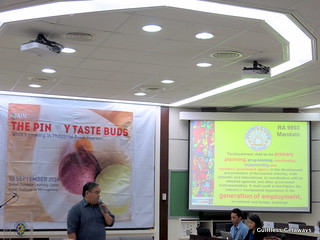
His talk was pretty informative to me and gave another layer to the term "tourism" with more focus on culinary adventures in the Philippines.
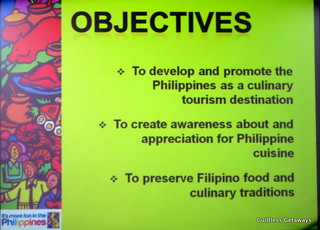
Like he said, there is no season to food. It's available all year round like the way we think of sili (chili) when we say Bicol and dried mangoes available in other countries.
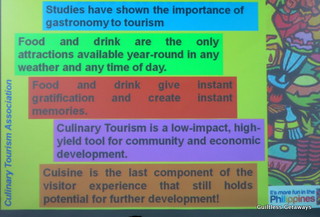
How many times have you been asked (as a Filipino) what examples of Philippine food are and you can only think of adobo (top of mind haha) or we just plain shock them with balut so that they don't ask more questions anymore? Adobo is available all over the country in different versions so this might explain that phenomenon but there are other food like sinigang (which he said is not common in the northern part of the Philippines), pansit, daing na bangus, paksiw, lechon, atsara, halo halo, leche flan, fiesta desserts (maja mais, fruit salad, buko pandan - recent) and many more. They've compiled these truly Pinoy representative dishes in one of their projects with 6 Pinoy chefs in the Kulinarya: A Guide to Philippine Cuisine Cookbook (available at National Bookstore ;) ). The second edition provides a glimpse of our heritage as well as best practices in preparing them.
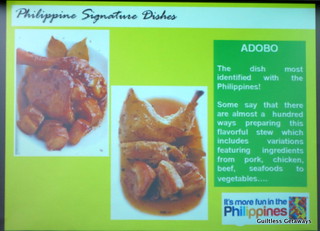
If you're not that skilled in the kitchen department, there are what they call Department of Tourism Kulinarya Food Trips. These are being coordinated with the PHILTOA (Philippine Tour Operators Association), PTAA (Philippine Tourism Agencies Association), the local government units and local tour consolidators. I didn't even know they had them haha. That's what I get for DIY-ing stuff hehe. I think there's really a stigma that if you participate in an organized tour then they're going to charge you lots but we almost don't consider that the convenience that comes with it has a value. The most famous one for me from their list is the Binondo Walking Tour by Ivan Man Dy. If you want to make your own tour like him or ride this wave then I believe the DOT would be happy to help you ;)
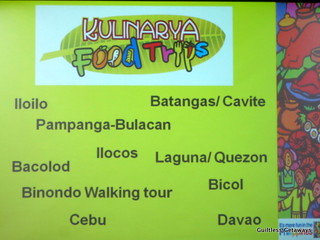
So if you're planning a trip and you want to go to these places, you can either call these tour operators (click here for the summary link) or take suggestions for your itinerary based on the food tour list below. There's an Ilocandia Culinary Tour (Ilocos), Boracay Food Trip, Iloilo Kulinarya, Negrenses Kulinarya (Negros, Bacolod), Cebu Kulinarya, Bohol Kulinarya, Kulinarya Dakak (Dapitan, Zamboanga), Batangas / Cavite Kulinarya (coffee), Kulinarya Tagala (Lucban, Sariaya, Tiaong),
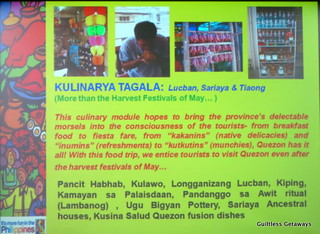
Taal Kulinarya (Taal, Batangas) - did you know that there's a "Sweet-serland" in Taal?! It's where they make all the sweets you see in the streets he said,
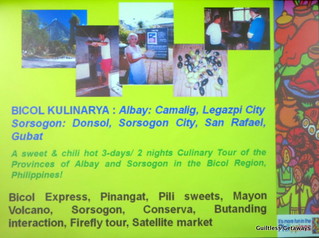
Pampanga / Bulacan Kulinarya (desserts and pastries, Pampanga: Bacolor, Lilia Borromeo Residence, Bulacan: Malolos, Pagkain ng mga Bayani),
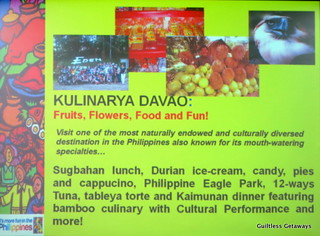
Mr. Sebastian said that these are spearheaded by the regional offices so I guess they can help lots when it comes to planning on kulinarya trips with festivals (so that you can experience the best of both) like January: Sinulog Festival (Cebu) with lechon, Ati-Atihan Festival (Kalibo with seafood), February: Pahimis Festival (Amadeo, Cavite) with coffee, Panagbenga Festival (Baguio) with organic veggies and strawberries, April: Bangus Festival (Dagupan), Guimaras Mango Festival (Iloilo - schedule changes depending on season of mangoes), May: Pahiyas Festival (Quezon), June: Parada ng Lechon Festival (Balayan, Batangas), August: Kadayawan Festival (Davao) with durian, December: Ligligan Parol Giant Lantern Festival (Pampanga) with panecillos de San Nicolas. There are many more festivals not listed here so it's best if you go to this Philippine festival listing by the NCCA (National Commission for Culture and the Arts) ;)
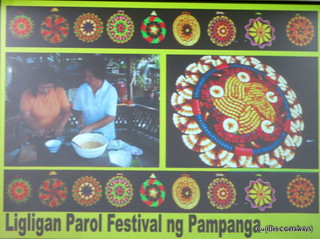
Aside from setting these up, the DOT has been busy with Kulinarya familiarization trips for travel agencies and media, travel fairs and food festivals abroad and inviting TV personalities like Anthony Bourdain (American) and Peter Kuruvita (Australian) to try out, experience and feature Philippine cuisine. Locally, they've been asking communities like Coron, Guimaras (Guisi), Sorsogon (Donsol) and Bulacan (Gawad Kalinga community) what their local food is and have conducted meetings on how to properly handle food for tourists.
A big event will also happen next year for Philippine gastronomy with the Madrid Fusion Manila 2015.
This event will include an exchange of ideas between Filipino chefs and chefs from Spain aside from a trade exhibition and gastro festival for the public. It was said that different people will benefit from this gathering and the current undertakings of the DOT when it comes to highlighting culinary programs as an approach to marketing the Philippines as a tourism destination. Some of the sectors being tour operators, restaurants, cultural performers, market vendors, food processors, farmers, etc.
Malaysian Culinary Head of Enderun College Chef See Cheong Yan gave us his insights as a foreigner living in the Philippines (married to a Filipina) next.
He started with a summary of relatable data based on his research. Baby boomers or Millenials - that's what he called our age group haha. Given the size of condos nowadays, the "young" prefer to eat out instead of meticulously preparing food at home. So as not to over generalize, I'm going to use myself as an example in his statements that I relate with. I travel, sometimes, because of food - to know where it comes from.
I recognize that I have certain food preferences that are unique to me. I am a bit concerned now with my health and what I eat. I am one of those who post pictures of my food in social media.
I am open to some new trends like the ramen phenomena and the growing organic food selections in Manila nowadays. I love hearing stories about the culture behind and origin of what I'm eating. I am ecstatic when I find sulit food deals. Long story short, addressing Millenial food preferences could be a worthwhile feat for tourism boards and the food industry as we make up a large chunk of the world's population :D
There's an internal paradox though that perhaps stunts Philippine cuisine to take off, according to him. One thing in common, I believe, even in different aspects in our life is how we perceive ourselves and if our answer is optimistic or not, it will just go 2 ways - stop us or propel us forward. Pinoys don't take foreigners to Filipino restaurants on special occassions, he said. Something to think about: Where do you go out to eat when you celebrate something? I guess some of us are tired of eating Pinoy food every day, huh? Well, I think we all have our moments. I'm a mix and sometimes, I would just find myself craving for some awesome Pinoy food. When a visitor comes, we usually have a fiesta to introduce them to Filipino delicacies or our favorite chibog hehe. In the case of crude presentation, he said that foreigners might not be used to seeing fish heads on the table if they come from countries serving just fillets-o-fish. I guess it has to be a balance of showing our true selves and being considerate enough to know more about our visitors in advance as well (or properly explaining our tradition) for a mutual and true cultural exchange. Coz we don't just travel to receive, we also give right?
Chef's optimistic forecast includes some tips for anyone who'd be interested in promoting Pinoy food. I think it's important to focus on the local tourists as well because as they said, with the unpredictable weather, political hullabaloo (why can't we all just get along?) and international flight cancellations nowadays, the locals will be the ones who will constantly show up (and will understand the situations better). We simply have natural connections (and cars) and other options to get to our desired Philippine destinations. We know the language and we get to have these easy conversations with our fellow Pinoys. There are so many other reasons and ultimately, we already know how fun it is in the Philippines ;)
The challenges (among many) that we face as a nation when it comes to food are to take only what we need (sustainability), to discover indigenous ingredients and use them creatively,
to appreciate that Pinoy food is not instant (some still wake up early and go to the market for lunch), to look into family recipes (maybe there's a story worth telling behind it), to look for the Filipino character in restaurants (who you are and what you've been through) and to bring in foreign tourists as a local tourist in your own independent culinary journeys (because there will always be hospitable Filipinos who treat their guests like family).
Some of the issues raised during the forum are the cost of Filipino food (not cheap according to a panelist) and farm-to-table restaurants (somebody commented the need to look at value added to justify costs, to tell the story so that people are willing to pay), the impression that Filipino street food is dirty (which DOT responded that they are trying to eventually address the issue of food safety through sanitary permits and the vision is for them to be under local government units) and the cases when the food is good but the kitchen is not so tour operators can't promote them to tourists. The issue on food information is also very important like allergies, Halal certified (like to attract Muslim tourists), nutritional requirements and dietary requirements. In short, it takes a whole lot of effort to get there and Pinoy food tourism is a sector that will continue to grow. It also includes Pinoy drinks such as lambanog, mango rum, gin, etc.
In line with the Pinoy merienda, we were served food like the Chori burger, pansit, puto and rainbow sapin-sapin. =)
One of our last speakers was ADMU Anthropology Professor Zialcita. His topic was about his take on why our culinary heritage is invisible to us. It even transcends to our literature, painting, music, dance and architecture, he said.
One of the reasons he stipulates is that culture is not represented properly in the curriculum. I've only heard of anthropology in university and even then, I think 3 units is not enough. I have a feeling I would switch majors then if I've found what path I want and what holds my interest 10 years earlier. Haha. I wonder if they had the Ateneo Cultural Laboratory then.. Oh well.. Maybe in the future I would be able to take part in a cultural and heritage mapping with them ( feeling student LOL).
He said that even if culture is taught in some subjects, it is overly pragmatic in a sense that it's all "how to do this" for future use without asking "why is this so" in the first place. Would you believe, for example, that tempura is not originally Japanese? How many times have you googled how to make tempura instead of why tempura is considered part of Japanese cuisine?
There's also the demonization of Western cultures like our Spanish influence. Those 300 years of history did have the good and the bad. He said that there is this notion that "culture has to be pure" for it to be authentic (when it's really a product of different influences, of our past and our present). This is where the tools like cross-cultural comparisons in anthropology can make a difference. We will be able to see what we gave to and what we received from cultures (all over the world), as well as tell what is unique to us (so that we take pride in it and preserve it for future generations).
Unfortunately, the particulars of Pinoy cuisine cannot be tackled all in one day. Check out AIM's coverage of the event here as this post is filled with my ramblings and insights hehe. Luckily, a take away (pabaon) from this forum is that for Filipinos, our colorful history shows that "what we receive, we transform" :)
At the end of this day, there's a whole lot of issues raised like the image of slum areas in the Philippines that turn off foreigners, the prevalence of disaster news only on TV unlike our counterparts in Asia, the need to study each target market when it comes to tourism, the lack of regional representation in Manila in terms of food when it's the capital, the depth of story provided by our travel guides and developing a module for promoting culinary tourism, a curriculum that not only provides instant jobs and skills in science and math but also instills a sense of pride and love for country, a curriculum for culinary tour guides, an ideal that our households don't only serve adobo and spaghetti to children in the absense of our super lolas with their heirloom recipes, a situation wherein we are not at a loss for words when asked about Pinoy food and we are able to talk non-stop about Filipino cuisine. The good news is that the stories and conversations keep flowing. I agree when they said we live in a fast-paced world. The only time we stop to hear stories, sometimes aside from forums like these, is when we're travelling or when we're on a tour. And so, it is adamant that we take steps to put those in order so that people have great experiences in our country, tell their friends and keep coming back for more ;)
The Pinoy Taste Buds: What's Cooking in Philippine Food Tourism? The Philippine Department of Tourism Kulinarya Food Trip Itineraries for Quezon, Taal, Bicol, Bulacan, Pampanga and Davao!
Tell me below: Any thoughts/ideas on how we can promote Philippine food better? Where do you take your foreign guests for Filipino food? Do you know of any nice food tours being offered in the country today aside from those mentioned above? What other issues (not mentioned above) do you think we can address when it comes to Pinoy food tourism (we don't necessarily have to have a solution yet)?
Tell me below: Any thoughts/ideas on how we can promote Philippine food better? Where do you take your foreign guests for Filipino food? Do you know of any nice food tours being offered in the country today aside from those mentioned above? What other issues (not mentioned above) do you think we can address when it comes to Pinoy food tourism (we don't necessarily have to have a solution yet)?
